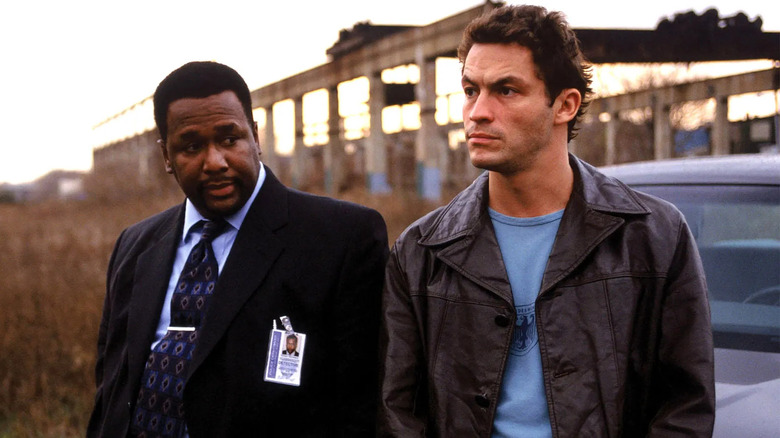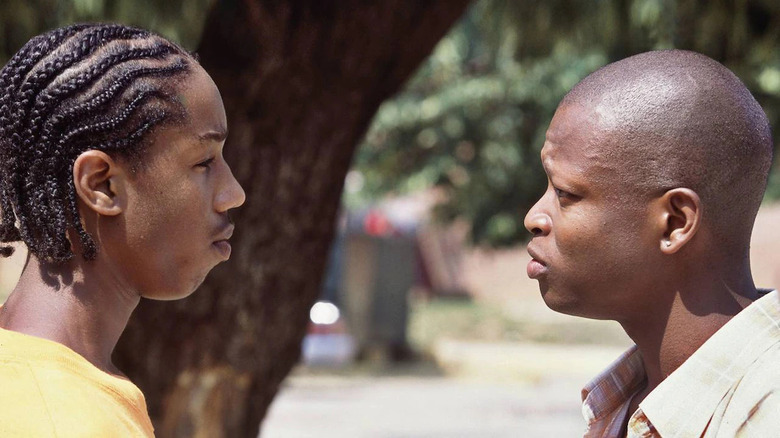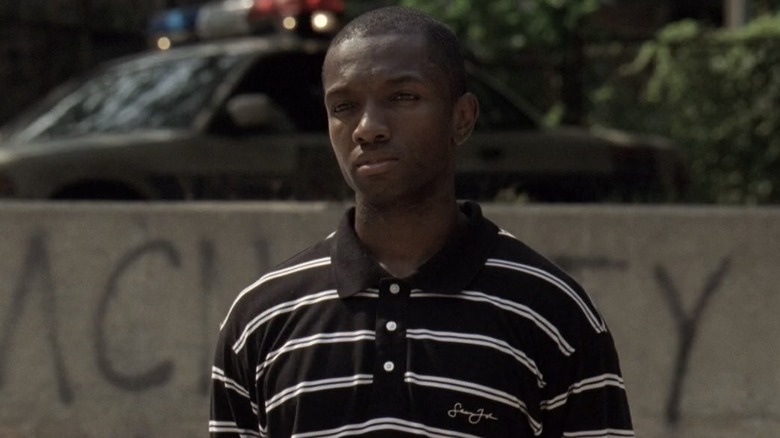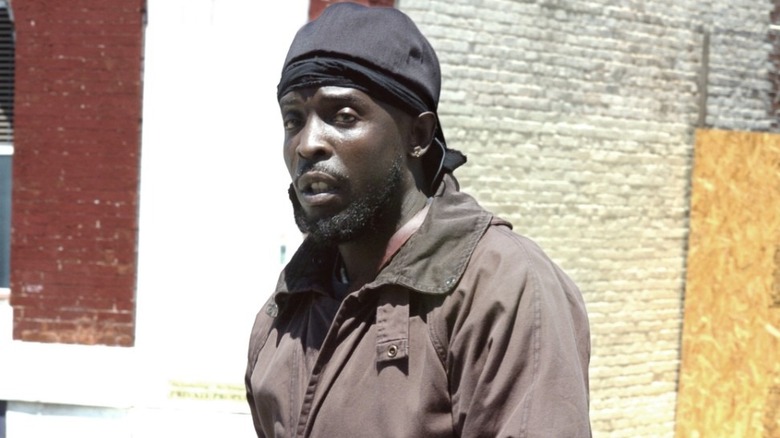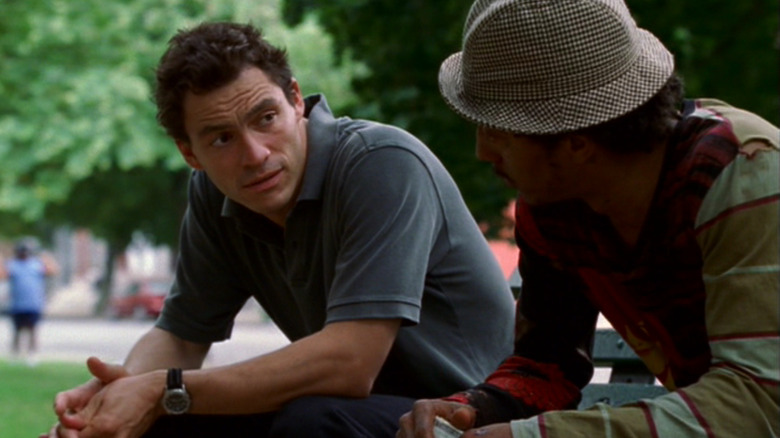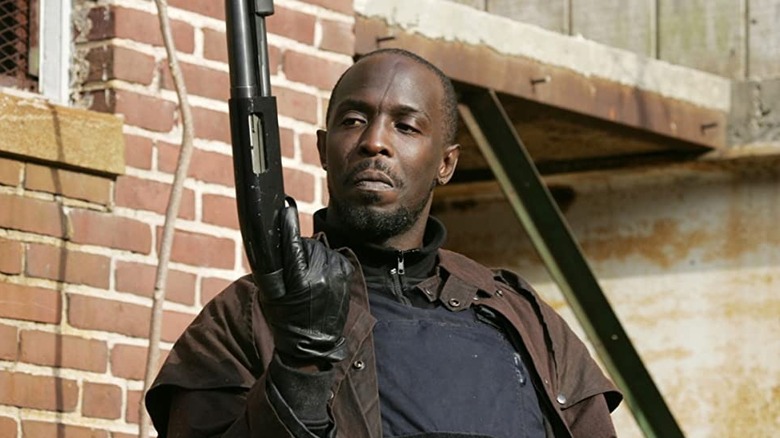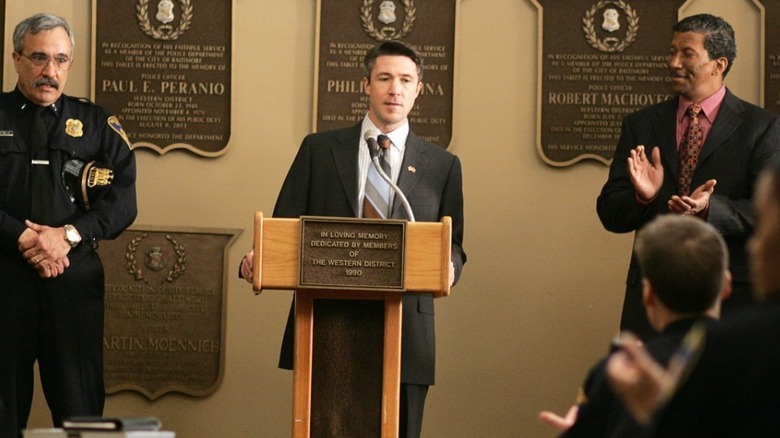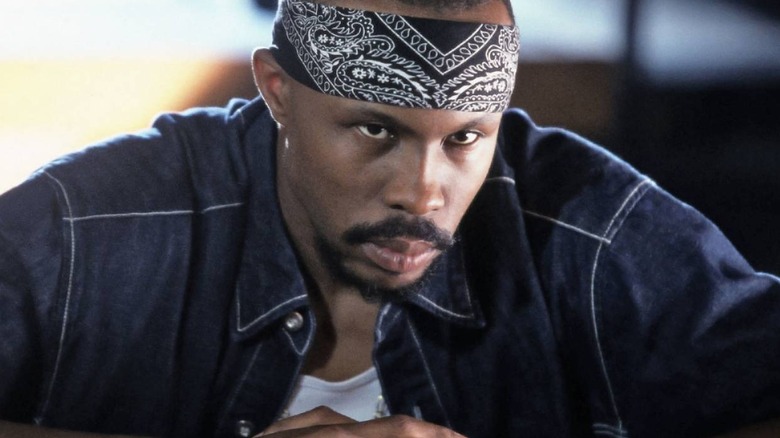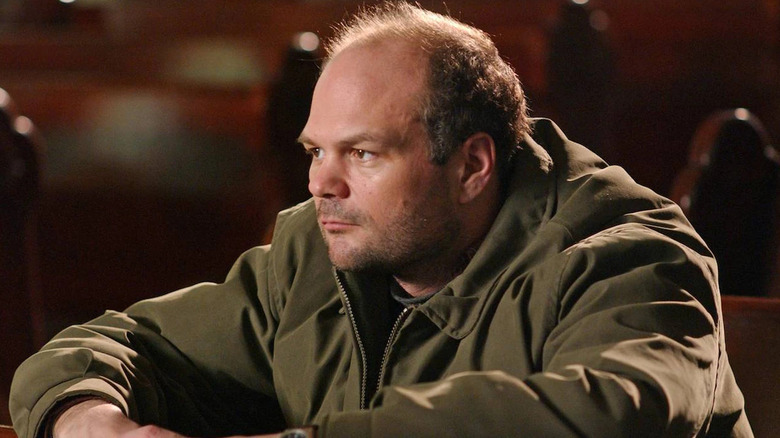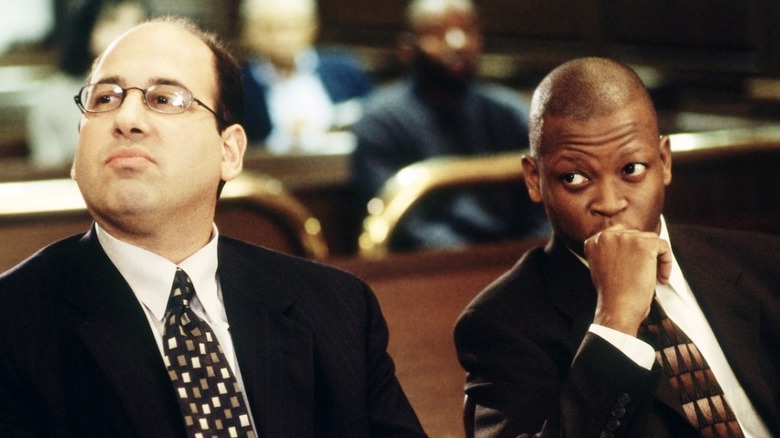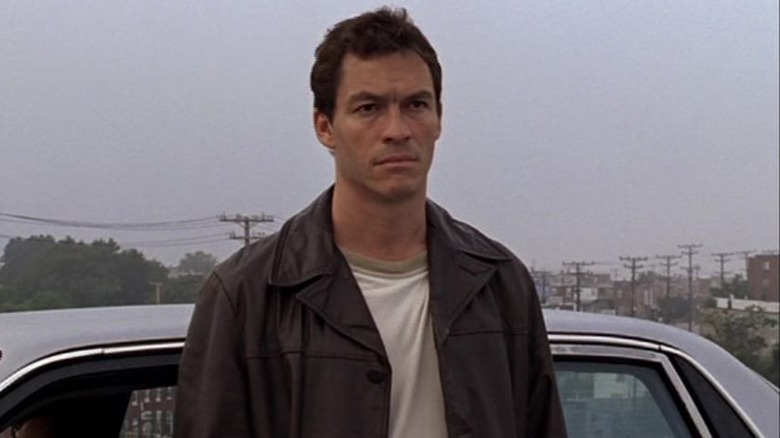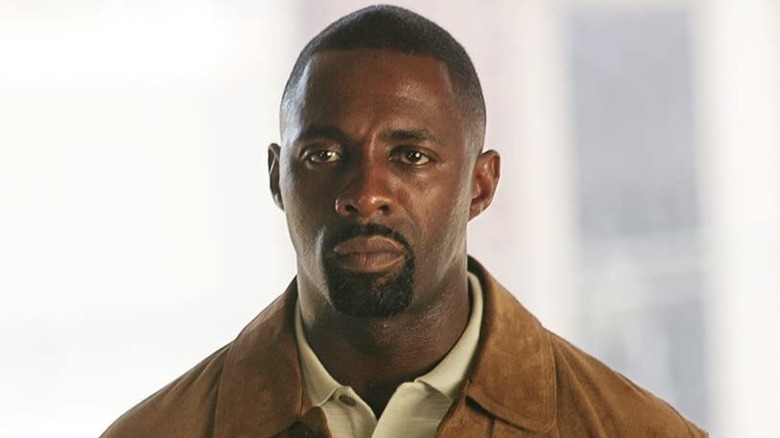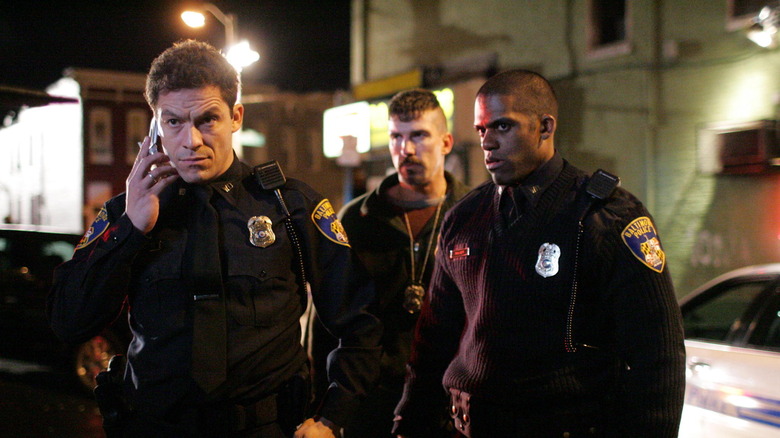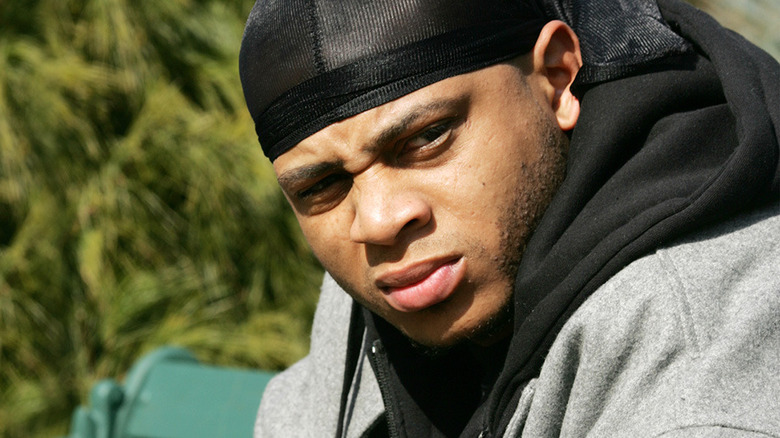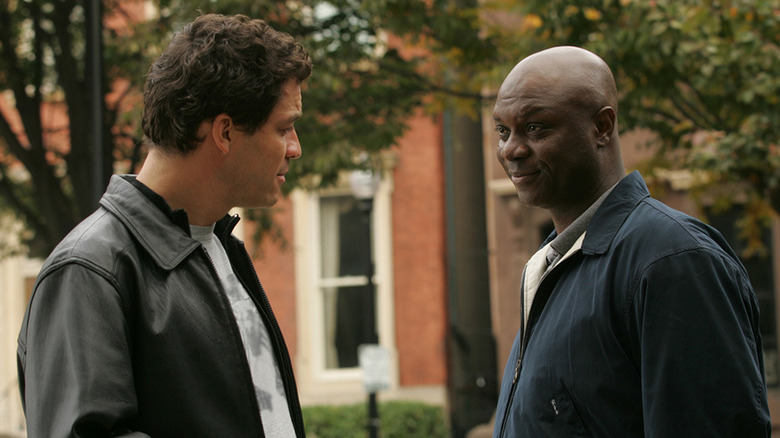The 14 Best The Wire Episodes, Ranked
"The Wire" is one of the most influential television shows of all time. David Simon's drama series explored the complexities of the drug war and allowed viewers to empathize with all of the different parties involved in the conflict. Not just a thrilling crime series, the show addressed themes of racism, systematic discrimination, drug abuse, plagiarism, educational disparity, and economic depression that are just as relevant today as they were when it was airing. The series served as a great learning tool about society's failings, giving more insights into the real world than most other crime shows ever could.
"The Wire" was organized into an intriguing narrative format. The first season focuses squarely on the Baltimore drug trade, showing the perspectives of both the cops and dealers. The second season incorporates characters who work at the trading ports. Season 3 deconstructs the city's fragile political state, and Season 4 explores the impacts of the drug war on the education system. Season 5 reflects on the events of the series by showing how they are perceived, and occasionally distorted, by journalists. By adding a new layer of complexity with each season, Simon was able to make the series feel completely realistic.
Although "The Wire" is one of the greatest shows ever, it's not perfect. Season 2 can be dull at times, and Season 5 incorporates some absurd storylines. However, when "The Wire" was at its best, it was hard to top it. Here are the 14 best "The Wire" episodes, ranked.
If you or anyone you know is struggling with addiction issues, help is available. Visit the Substance Abuse and Mental Health Services Administration website or contact SAMHSA's National Helpline at 1-800-662-HELP (4357).
14. Cleaning Up (Season 1, Episode 12)
There isn't a death in "The Wire" that is more devastating than the loss of Wallace. Wallace was the heart of the show; a young boy who tried to build a better life for himself, but is caught in the turmoil of the drug conflict. Wallace is backed into an unenviable situation in "Cleaning Up." Facing pressure from the police, Wallace reluctantly informs on Stringer's operation, so Stringer sends Bodie and Poot to kill Wallace.
The entire sequence is simply nauseating. Even at a young age, Michael B. Jordan proved that he was an actor to watch with his emotional performance. He shows the vulnerability of a helpless child as Wallace pleads for his life before he's ruthlessly shot to death. The episode becomes even more tragic when D'Angelo (Lawrence Gilliard Jr.) learns what Stringer has done when he talks with McNulty. He cries out, "Where's Wallace?" even though he knows what has happened.
13. Late Editions (Season 5, Episode 9)
One of the most powerful aspects of "The Wire" is seeing how each season's storyline builds on top of one other. Earlier seasons introduced a group of younger school boys, and by Season 5, they had grown up into young men. Unfortunately, the "boys of summer" are doomed to fall into the roles that society has predetermined for them.
Young crime boss Marlo has grown from a street-level threat to one of the most powerful figures in the Baltimore underworld. In "Late Editions," Marlo is arrested during a drug raid. He finds a surprising new ally: the corrupt lawyer Maurice Levy (Michael Kostroff), one of the most unlikeable characters on the show. Levy gives Marlo advice while he is locked up, and offers to help him turn into a more sophisticated criminal. It's clear that Marlo is destined to become the politically-connected criminal that Stringer had once been.
12. Clarifications (Season 5, Episode 8)
"The Wire" has a lot of shocking character deaths, but the murder of Omar is one of the most surprising. Omar goes on a personal vengeance quest in Season 5, but he's shot to death in a corner store by a young boy, Kenard (Thuliso Dingwall), within the opening moments of "Clarifications." It's ironic that Omar meets his fate at the hands of a child, as earlier scenes indicated that Chris Partlow (Gbenga Akinnagbe) and Snoop (Felicia Pearson) were tracking him down.
Season 5 spends a significant amount of time dedicated to showing the inner workings of The Baltimore Sun newspaper. Prior to becoming a showrunner and television writer, David Simon had served as a police reporter in Baltimore for over a decade. As a result, his insights on the evolution of journalism are particularly realistic. "Clarifications" continues the story of dishonest reporter Scott Templeton (Tom McCarthy) and his fake news articles.
11. Sentencing (Season 1, Episode 13)
The first season of "The Wire" concludes with a powerful moment where Omar corners another drug dealer. Laughing, Omar remarks, "It's all in the game." It's the perfect note to end on. David Simon does a great job of showing that the drug crisis can not be explained with only facts and figures, but there is a "game-like" quality to how it's organized. The police, the dealers, the civilians, and the government are all just "playing the game" to reap the benefits. In the end, no one really wins.
The episode "Sentencing" shows that there are no easy solutions to any of the societal issues that "The Wire" is addressing. While Avon is arrested, Stringer is still free to run his organization. A disgruntled McNulty leaves the courtroom in anger. He knows that Stringer is the brains behind the Barksdale operation, and that things are bound to stay the same.
10. That's Got His Own (Season 4, Episode 12)
In terms of devastating storylines, few subplots in "The Wire" are as emotional as the story of the homeless man Bubbles (Andre Royo). Bubbles struggles to kick his heroin addiction, but is never offered the resources that he needs to become sober. In the episode "That's Got His Own," Bubbles suffers an unimaginable loss. His young friend, Sherrod (Rashad Orange), dies after taking vials from Bubbles' stash. Bubbles is forced to live with the guilt of Sherrod's death for the rest of the series' run. Royo's emotional breakdown after the tragic death is one of the greatest acting moments in the show's history.
"That's Got His Own" also continues the compelling character arc of Roland Pryzbylewski (Jim True-Frost), also known as "Prez." Prez had been a cop, but retired from the force after accidentally killing a fellow officer during a shootout. In Season 4, Prez takes a new job as a teacher. It's clear that he wants to help the young boys that are struggling, and goes above and beyond to reach out to them. There's a touching moment in "That's Got His Own" where Prez visits the home of his student Randy Wagstaff (Maestro Harrell) to give him his schoolwork.
If you or anyone you know is struggling with addiction issues, help is available. Visit the Substance Abuse and Mental Health Services Administration website or contact SAMHSA's National Helpline at 1-800-662-HELP (4357).
9. A New Day (Season 4, Episode 11)
False promises are essential to the thematic subtext of "The Wire." David Simon doesn't come off as a pessimist but as a realist. Often, those who promise change only adhere to the status quo. This is certainly the case with the newly elected Mayor Carcetti. Carcetti had campaigned on a platform of social change and reform, but he begins to face backlash as soon as he starts putting his campaign promises into action. Carcetti finds that he won't be able to reform the police department as he had intended.
Carcetti also learns another devastating truth about what he has inherited from Mayor Royce's administration: The school system is almost entirely bankrupt. Season 4 primarily focuses on the experiences of the young boys that are recruited to become dealers, and the viewers were already familiar with the disparity in the education system. Carcetti's stunned reaction arguably proves that the government is completely ignorant of what is really going on in the daily lives of its constituents.
8. The Cost (Season 1, Episode 10)
"The Wire" established from the very beginning that it was willing to go into darker territory than most other shows were capable of. This was solidified in the Season 1 episode "The Cost," which showed several different characters recovering from emotional trauma. What made "The Wire" such a game-changer was creator David Simon's empathy. He didn't just take the time to explore how the different institutions connected; he showed that cyclical violence had a cost to each of the characters' mental health.
Police officer Kima Greggs (Sonja Sohn) has a quiet moment where she reveals why she wanted to become a police officer to her partner, Cheryl (Melanie Nicholls-King). While this is a rarely heartwarming moment allowing the two to bond, Greggs is quickly thrust into a dangerous situation. After helping to orchestrate a drug bust, Greggs is shot and nearly killed, and it's unclear at the end of the episodes if she has survived the attack. The scene served as one of the show's greatest cliffhangers.
7. Bad Dreams (Season 2, Episode 11)
The second season of "The Wire" isn't its best, but it gets a bad rap. Season 1 was exciting because of the "newness" factor, Season 3 made the show feel more timely with its political angle, and Season 4 had the emotional hook of the younger characters. In contrast, Season 2 took a bold swing with its slower pace. "The Wire" has always been methodical, but the second season really dives into the macro-level details of the Baltimore economy. It also introduced one of the series' greatest characters: Frank Sobotka (Chris Bauer), a Polish-American trade leader on the Baltimore docks, who struggles to retain his integrity as his ports begin engaging in illegal trade.
Season 2 hit its climax in the penultimate episode "Bad Dreams." Frank has struggled to take care of his son, Ziggy (James Ransone). The two characters are almost complete opposites: Frank is a hardworking community leader, and Ziggy is a notorious troublemaker. Ziggy's shrill attitude is obnoxious in the earlier episodes, but "Bad Dreams" takes the time to explore the troubled relationship that he has with his father. Frank is depressed by his son's behavior, but that doesn't mean that he wants to see him die. Frank walks into a meeting with the crime boss known as The Greek (Bill Raymond) at the end of the episode. He's aware that he is unlikely to survive, but hopes that it will save Ziggy from a similar fate.
6. The Target (Season 1, Episode 1)
"The Wire" had a clear idea of what it wanted to be from the very beginning. In terms of sheer economy, the pilot episode, "The Target," is breathtaking with how judiciously it spends its time. Within an hour of television, David Simon introduces all of the important players, institutions, and themes of the first season. It's overwhelming, for sure, but that was intentional. It's hard not to look at the chaotic drug war and reflect on how mismanaged it has been.
One of the best things about "The Wire" is that it truly does not have one main star, and few characters come across as entirely good or evil; they're all human. Jimmy McNulty isn't necessarily the series' lead, but he's an effective audience avatar for the pilot. The episode opens with a quiet moment featuring McNulty observing the crime scene of a recent murder case. He wonders what sort of system would allow violence like this to become routine. The questions that McNulty asks himself are the same ones that the viewers would be forced to contemplate for the entirety of the series.
5. -30- (Season 5, Episode 10)
It's unfortunate that "The Wire" never received a sixth season because there were clearly more stories within the show's version of Baltimore left to be explored. Not to mention that another season could have helped redeem the disappointing fifth season. The show that had been so acclaimed for its realism developed a ridiculous storyline about a fake serial killer. Yet, despite the faults that emerged towards the end, "The Wire" still managed to deliver an excellent series finale.
Every long-running show faces the same challenge as it develops its conclusion. Do the ends justify the means, and did the viewers' investment pay off? "-30-" isn't a traditionally satisfying finale. Some of the show's storylines are left open-ended, and many of the same issues that were present from the very beginning are still causing problems. Ultimately, this was the point that David Simon was making. While there are reasons to be hopeful, many of the city's failings can't be fixed in a short period of time. "The Wire" creator discussed these themes with President Barack Obama, who admitted to being a "massive fan" of the series. Each season of "The Wire" concludes with a montage that shows the characters entering a new stage in their lives. The final moment of the series reveals McNulty looking over the city before returning home.
4. Middle Ground (Season 3, Episode 11)
"Middle Ground" is among the most tragic episodes of "The Wire." The death of Stringer Bell is one of the most shocking moments in the entire series. The character receives a great sendoff through his final conversation with Avon. The two men have been friends for nearly their entire lives, and they take a moment to reflect on everything that they have learned from each other. However, Stringer worries that Avon will doom himself if he continues waging conflict against Marlo. Stringer reluctantly agrees to pass on information about Avon's plans to Colvin.
Brother Mouzone (Michael Potts) shows up to inform Avon about Stringer's betrayal. Heartbroken, Avon realizes that he will be forced to let Stringer go. Mouzone teams up with Omar to track down Stringer in the episode's exciting final moments. The resulting shootout is one of the show's best action sequences. Stringer is often one of the most confident characters in the series, so it's interesting to see him made completely vulnerable. "Mission Accomplished" also deepens Avon as a character. He attends a meeting with Cutty, who is raising money for a boxing facility for young men, hoping to get more youth off of the streets. Unfortunately, Cutty's equipment is broken down and worn out. When Cutty asks Avon for money to improve his facility, Avon initially mocks him but agrees to give him some funds. We see the positive impact immediately as Cutty helps coach a few aspiring boxers.
3. Margin of Error (Season 4, Episode 6)
"Margin of Error" is one of the most exciting episodes of "The Wire." Although the political storyline emerged in the third season, Election Day itself is incorporated in Season 4. It's a fraught race between Mayor Clarence Royce (Glynn Turman), Councilman Anthony Gray (Christopher Mann), and Councilman Carcetti. All three candidates attend a church service on Sunday morning as they try to win the vote of the community's religious leaders. It places the viewer in an interesting position, where they must contemplate which candidate will actually help Baltimore.
Royce is corrupt and refuses to change the status quo. Carcetti is young and passionate, but his political ruthlessness suggests that he's more interested in rising through the ranks than he is in enacting change. Gray is naive, but it's hard not to sympathize with him; he'd planned to enlist Carcetti's help, but was unaware that his friend was also intending to run. Ultimately, Carcetti's victory creates a ripple effect that sets the course for the rest of the series. "Margin of Error" also continues the intriguing partnership between Omar and McNulty. Their interactions are fascinating, because both characters are outsiders within their respective professions. McNulty is an untraditional cop whose aptitude for breaking the rules often draws ire from his superior officers. Omar is a "Robin Hood"-esque figure within the criminal underworld. Omar is nearly killed here, but it is revealed that Butchie (S. Robert Morgan) was sent to protect him.
2. Final Grades (Season 4, Episode 13)
Each season finale of "The Wire" ends in media res. One of the things that made the series such a game-changer was how David Simon refused to wrap up the show's narrative arcs in a way that would seem "satisfying" to viewers. In real life, corrupt and malicious people rarely face the consequences of their actions, so why should the fictional world be any different? While the first season hit emotional highs with the death of Wallace (Michael B. Jordan), the fourth season shows how an entire generation of young boys are seduced into joining the drug trade. The city's law enforcement is so insistent on nailing the big drug dealers that they don't realize another generation is being prepared to replace them.
"Final Grades" includes one of the most powerful conversations in the series. Bodie Broadus (J.D. Williams) meets with McNulty in a city park to discuss Marlo's operation. While these two characters have been at odds with each other for the entire series, they share a rare moment of sincerity. Bodie doesn't want to inform on his organization, but he's been tormented by Marlo's leadership. After they reach an understanding, Bodie is murdered by O-Dog (Darrell Britt-Gibson). It's a completely shocking moment. Meanwhile, despite his campaign promises of change, Carcetti ultimately does not start developing plans to improve the school system, instead choosing to start preparing his campaign to run for governor.
1. Mission Accomplished (Season 3, Episode 12)
The third season of "The Wire" concludes with one of the most beautiful moments in the entire series. In a montage set to Solomon Burke's song "Fast Train," the show explores how each of the characters becomes trapped in the never-ending cycle of crime. It's a perfect embodiment of the show's themes. David Simon's point has always been that there's no way to fight violence with violence; if you take out one drug dealer, they will just be replaced by someone else.
The montage of "Mission Accomplished" incorporates moments of both hope and despair. It perfectly wraps up the political storyline of the season, and sets the stage for the upcoming election in Season 4. The characters adjust to their new positions: Jimmy McNulty (Dominic West) enjoys his new job as a street cop; Howard Colvin (Robert Wisdom) reflects on his failures; Tommy Carcetti (Aidan Gillen) prepares for his mayoral campaign; Marlo Stanfield (Jamie Hector) attends Avon Barksdale's (Wood Harris) trial; Omar Little (Michael Kenneth Williams) tosses his weapon into the water; Ellis Carver (Seth Gilliam) enters Cutty Wise's (Chad L. Coleman) community gym; Maurice Levy (Michael Kostroff) defends the members of the Barksdale Organization that are on trial, and Donette (Shamyl Brown) mourns the loss of Stringer Bell (Idris Elba). Some things are different, but way too much remains the same.
